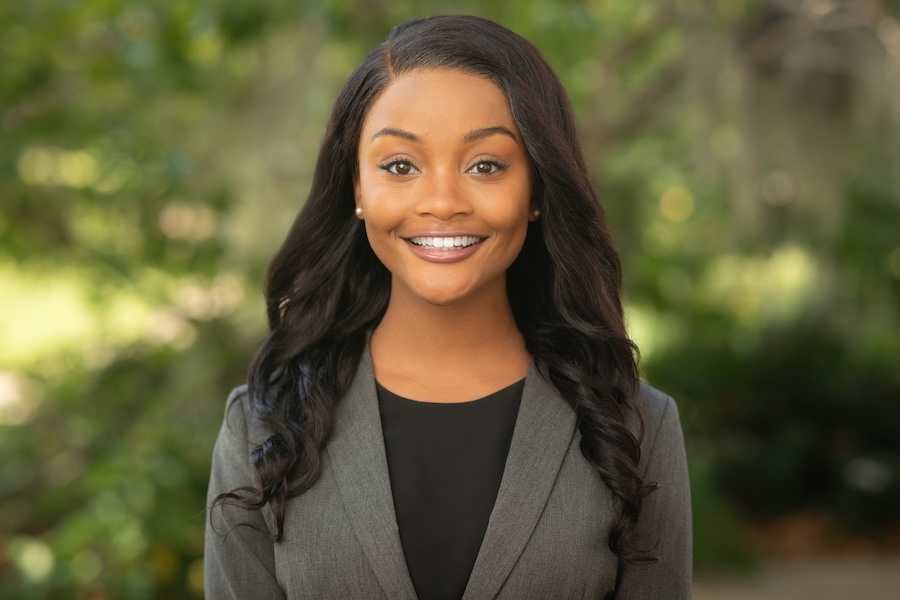Student Spotlight: Kadesha Reynolds

Kadesha Reynolds is a Florida State University alumna and third-year doctoral student studying applied and computational mathematics through the Department of Mathematics, part of the College of Arts and Sciences, with plans to graduate in May 2028. Reynolds earned a bachelor’s in pure mathematics in 2022, and her current research involves developing algorithms that improve predictions and decision-making in uncertain systems like hurricane forecasting and financial market modeling. In 2023, Reynolds earned a highly competitive McKnight Dissertation Fellowship to support her doctoral studies.
Tell us about your background, where you’re from and what brought you to FSU.
I’m from Fort Lauderdale, Florida, and started my undergraduate studies in 2018. FSU provided the warmest and most welcoming environment. I knew I’d be able to build a rigorous academic foundation because of the groundbreaking research conducted here.
What inspired you to pursue degrees in mathematics?
I’ve always loved math, and I especially enjoy teaching and helping others understand mathematical concepts. I’ve been a math tutor for more than 11 years, and many students ask about the subject’s relevance beyond the classroom. Their curiosity, combined with my passion for a deeper exploration of applied mathematics, inspired me to pursue my degrees. After graduating, I plan to become an applied mathematics professor before working in the industry as a machine learning engineer.
What aspects of your studies do you find most rewarding?
I love using mathematics to address real-world challenges. In my program, I’ve explored problems in wave propagation — the way sound, light, or water waves travel and spread through different environments — which is especially important in aeronautics for understanding how air flows around aircraft. I’ve also studied ML applications that support health diagnostics and models of natural disasters like hurricanes. I’m excited to contribute to research that helps communities receive early warnings and prepare for these kinds of challenges, potentially saving lives.
Break down your areas of research for us.
I research data assimilation and the ensemble score filter — a computational method that uses an ensemble of possibilities to update and refine predictions as new information comes in — which was developed by my adviser, Feng Bao, the Timothy Gannon Endowed Associate Professor of Mathematics. Data assimilation combines predictions from mathematical models with physical observations to generate accurate estimates of a system’s state. While weather models predict the path a hurricane may travel, combining that prediction with real-time satellite data provides much more accurate forecasts.
The ensemble score filter is especially effective for nonlinear, high-dimensional problems in which traditional mathematical methods struggle, such as tracking the spread of diseases. Many natural models involve uncertainty, so I use equations that account for randomness to improve estimates of system states. We’re developing tools to make faster and more reliable decisions in high-stakes fields, from issuing earlier natural-disaster warnings to reducing financial risks.
What do you want the public to know about the importance of your research?
Data assimilation is vital for many fields, and by researching the ensemble score filter, we can address issues in climate science, medicine, and engineering with increasing accuracy and reliability. Whether we’re tracking a hurricane or modeling the spread of ocean pollution, we need a way to bridge massive data sets, complex physical laws, and uncertainty to create solutions that protect communities and inform decision-makers.
Tell us about earning the McKnight Doctoral Fellowship. What does earning this fellowship mean to you?
It’s an honor. The fellowship provides me with a remarkable community that supports me academically, socially and emotionally. As a first-generation college student, pursuing a doctorate once felt out of reach, but the fellowship has empowered me to achieve my goals. It inspired me to serve as a role model for others who hope to follow a similar path.
Tell us about current projects you’re working on.
I’m researching data assimilation using the ensemble score filter and comparing it to traditional methods such as the Kalman filter, which updates predictions by blending model outputs with new data, and the ensemble Kalman filter, one that uses many model runs to capture uncertainty. I’m applying these techniques to partial differential equations, which describe how things change over space and time. For example, the heat equation explains how heat spreads while the Navier-Stokes equations describe fluid motion, like air flowing over an airplane wing or ocean currents.
Unlike many data-driven methods, the ensemble score filter doesn’t require training and testing phases. It reduces computational complexity by using ensemble statistics — information gathered from running a group of model simulations instead of just one — and score functions, which measure how well a prediction matches the observed data.
I hope to better understand how it performs in high-dimensional, nonlinear systems and to develop more efficient and accurate tools for modeling complex natural phenomena.
Are there any faculty or staff who have helped, mentored or inspired you?
The support I’ve received from FSU faculty and staff has been tremendous, and I’m incredibly grateful. My adviser, Dr. Bao, has inspired me to reach my academic and professional goals. He’s been encouraging and supportive throughout my journey, and I’m fortunate to have him as my mentor.
What on-campus resources have helped you achieve success?
The Robert Manning Strozier Library and Dirac Science Library have been instrumental to my success by providing productive study environments. I often chose a spot on the fifth floor of Strozier near the large windows where I could see the trees. That peaceful view helped me stay focused during study sessions.
What advice do you have for fellow students? What advice do you have for undergrads?
College can be academically demanding, but it’s important to prioritize your well-being alongside your studies. While it’s easy to become immersed in coursework, remember to take care of yourself. Taking short breaks, walking around campus, or reconnecting with family and friends can make a big difference in maintaining balance. Lean on your support system when needed and remember that you’re not alone.
